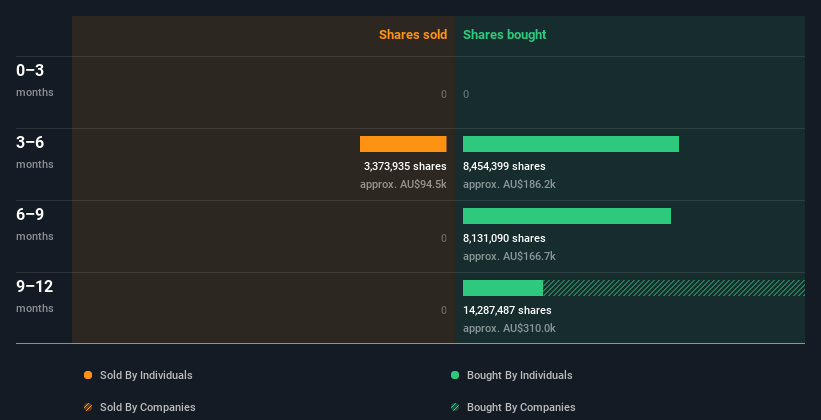Favourable Signals For Spacetalk: Numerous Insiders Acquired Stock
It is usually uneventful when a single insider buys stock. However, When quite a few insiders buy shares, as it happened in Spacetalk Limited's (ASX:SPA) case, it's fantastic news for shareholders.
Although we don't think shareholders should simply follow insider transactions, logic dictates you should pay some attention to whether insiders are buying or selling shares.
See our latest analysis for Spacetalk
Spacetalk Insider Transactions Over The Last Year
In the last twelve months, the biggest single purchase by an insider was when Independent Non-Executive Chairman Georg Chmiel bought AU$194k worth of shares at a price of AU$0.028 per share. That means that even when the share price was higher than AU$0.017 (the recent price), an insider wanted to purchase shares. It's very possible they regret the purchase, but it's more likely they are bullish about the company. We always take careful note of the price insiders pay when purchasing shares. It is generally more encouraging if they paid above the current price, as it suggests they saw value, even at higher levels. Notably Georg Chmiel was also the biggest seller.
Happily, we note that in the last year insiders paid AU$452k for 19.74m shares. But they sold 3.37m shares for AU$94k. In total, Spacetalk insiders bought more than they sold over the last year. Their average price was about AU$0.023. This is nice to see since it implies that insiders might see value around current prices. You can see a visual depiction of insider transactions (by companies and individuals) over the last 12 months, below. By clicking on the graph below, you can see the precise details of each insider transaction!
There are plenty of other companies that have insiders buying up shares. You probably do not want to miss this free list of undervalued small cap companies that insiders are buying.
Insider Ownership
I like to look at how many shares insiders own in a company, to help inform my view of how aligned they are with insiders. I reckon it's a good sign if insiders own a significant number of shares in the company. Spacetalk insiders own about AU$2.0m worth of shares. That equates to 24% of the company. This level of insider ownership is good but just short of being particularly stand-out. It certainly does suggest a reasonable degree of alignment.
So What Do The Spacetalk Insider Transactions Indicate?
There haven't been any insider transactions in the last three months -- that doesn't mean much. However, our analysis of transactions over the last year is heartening. Insiders own shares in Spacetalk and we see no evidence to suggest they are worried about the future. So these insider transactions can help us build a thesis about the stock, but it's also worthwhile knowing the risks facing this company. To help with this, we've discovered 6 warning signs (5 are potentially serious!) that you ought to be aware of before buying any shares in Spacetalk.
Of course, you might find a fantastic investment by looking elsewhere. So take a peek at this free list of interesting companies.
For the purposes of this article, insiders are those individuals who report their transactions to the relevant regulatory body. We currently account for open market transactions and private dispositions of direct interests only, but not derivative transactions or indirect interests.
Have feedback on this article? Concerned about the content? Get in touch with us directly. Alternatively, email editorial-team (at) simplywallst.com.
This article by Simply Wall St is general in nature. We provide commentary based on historical data and analyst forecasts only using an unbiased methodology and our articles are not intended to be financial advice. It does not constitute a recommendation to buy or sell any stock, and does not take account of your objectives, or your financial situation. We aim to bring you long-term focused analysis driven by fundamental data. Note that our analysis may not factor in the latest price-sensitive company announcements or qualitative material. Simply Wall St has no position in any stocks mentioned.
Have feedback on this article? Concerned about the content? Get in touch with us directly. Alternatively, email editorial-team@simplywallst.com

 Yahoo Finance
Yahoo Finance 
